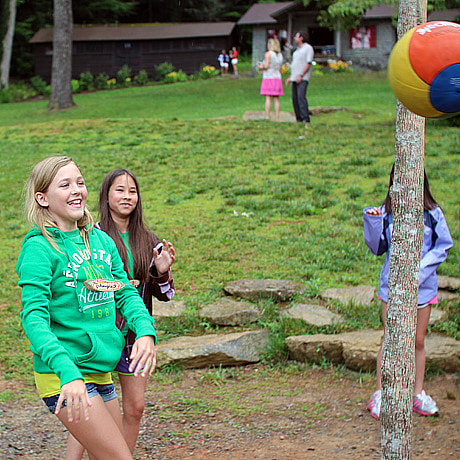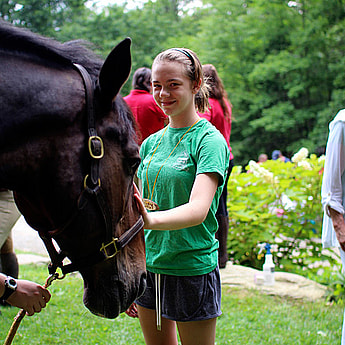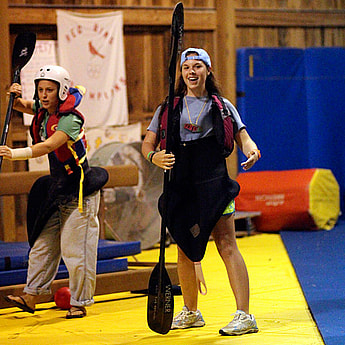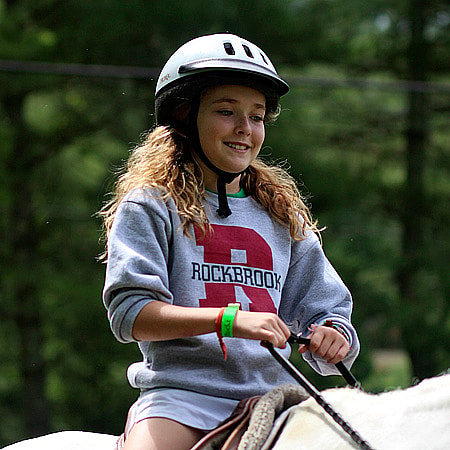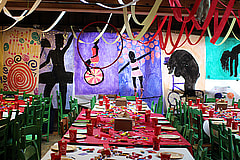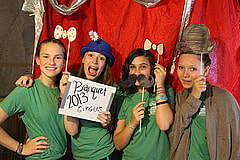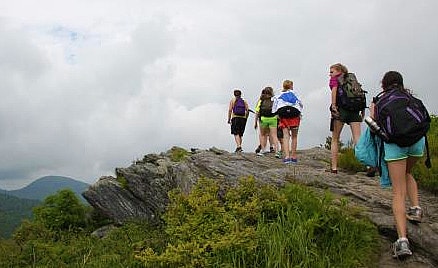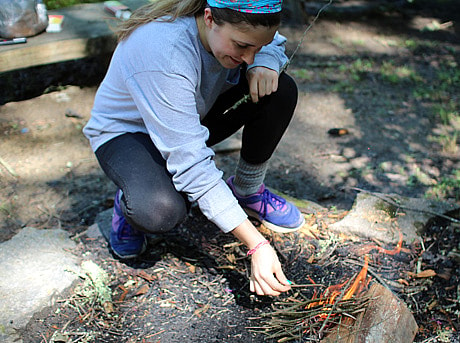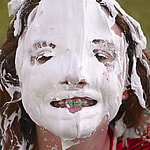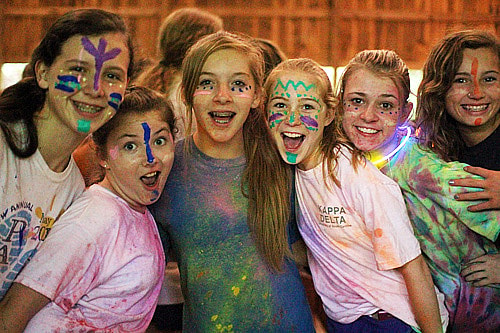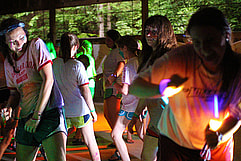Here it is, only the second full day of the session, and we’ve already got almost half of the camp out whitewater rafting on the Nantahala river. This many girls excited to go, to jump right into an outdoor adventure, was no surprise because these second session Rockbrook girls are full of energy, and these trips are so awesome. The word is out, if you come to Rockbrook (and you’re old enough… Unfortunately, the US Forest Service permit we hold limits our rafting to girls who are 5th grade and older), you’ll get to go whitewater rafting.
We actually started this extravaganza day of rafting the night before with 3 buses of girls packing sleeping bags and extra clothes to go spend the night at Rockbrook’s outpost camp over near the river in Swain County. The outpost is a unique piece of property Rockbrook acquired and improved back in 1988. It adjoins the Nantahala National Forest, is more than 1000 feet higher in elevation than Rockbrook’s main camp property, and is only about a mile from the Appalachian Trail. To say it’s “in the middle of nowhere” is pretty accurate, or at least it definitely feels like it when we arrive with the girls. The outpost is a great place to spend the night with a large group too, with 3 large camping shelters (each screened in, with a tin roof, and deck jutting out into the woods), a simple bathroom, but also a dining hall where we can serve meals. With the group settled into the shelters, we first devoured our dinner of pasta, salad and fruit, and afterwards, gathered around the campfire pit for the evening. It was just getting dark as Chase finished the fire and sent the girls scurrying about looking for a marshmallow roasting stick (avoiding the slightly toxic branches from rhododendron and mountain laurel bushes). This was very exciting because she also had a basket of graham crackers and chocolate bars, which meant we were going to make s’mores. Soon there were some marshmallows burnt to a crisp, and others patiently roasted to a golden brown, allowing everyone to have fun making this classic camping treat.
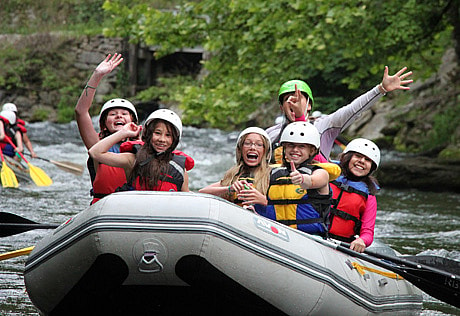
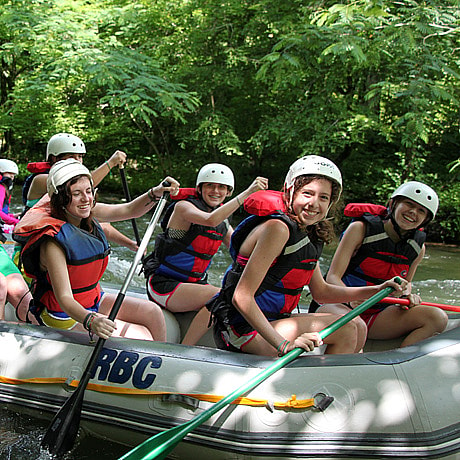
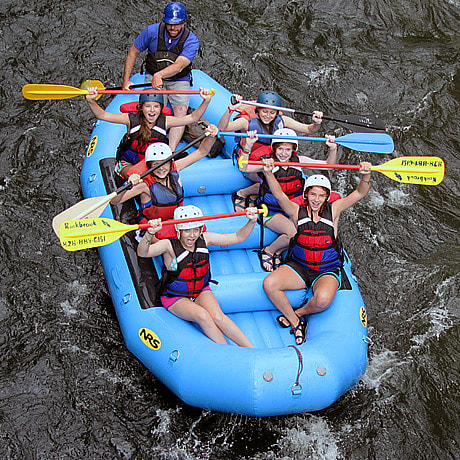
The next morning about 9am, we met our team of raft guides at the river’s edge to gear up for our whitewater adventure, the first of two for the day. A helmet, PFD and paddle for each girl, and 5-7 girls per raft, we outfitted 7 boats for this trip. The Nantahala, which is a Cherokee word meaning “River of the noonday sun,” is a river formed by both a natural flow and extra water released through Duke Energy’s hydroelectric plant. Throughout the day, water from the bottom of the Nantahala Lake is released back into the river making it great for rafting, albeit quite cold too (about 53 degrees). This morning we had bright sunshine though, so all the splashing and even the occasional (intentional or unintended) swim felt good.
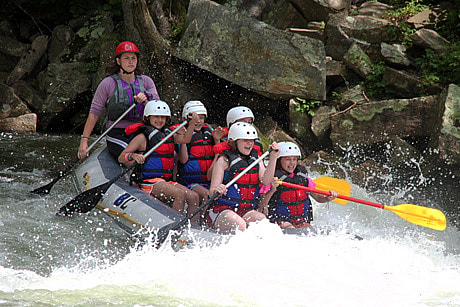
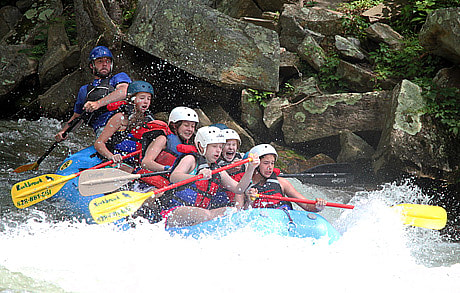
If you look at the terrified faces of the girls in these rafting photos, it might be difficult to understand why our campers love it so much. I think the answer begins with the fact that rafting is first of all a fun, social activity. In the boats there’s time to chat, sing, laugh, and goof around together, like when making up a cheer or slapping a “high five” with everyone’s paddles. Also though, rafting is a special thrill because it’s such a pure adventure. It’s a got an element of danger (managed by established safety procedures and equipment of course), a risk that something might go wrong, like falling out of the boat, that we successfully conquer in the end. The struggle of the experience, in this case the cold water, the rocks and waves of the river, the challenge of it all, makes succeeding feel really good. The girls can sense that through their efforts, they’ve accomplished something. In this way, though they wouldn’t put it like this, whitewater rafting is a boost to their self confidence, masquerading in a wet and wild ride down the river.
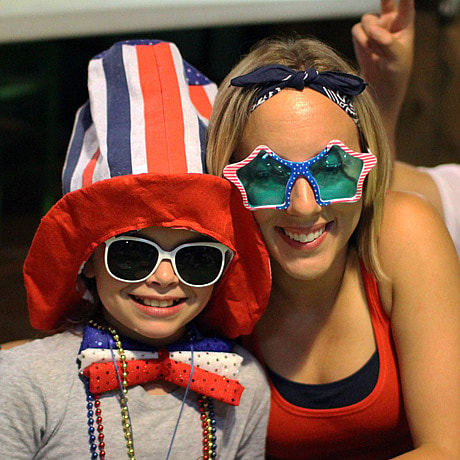
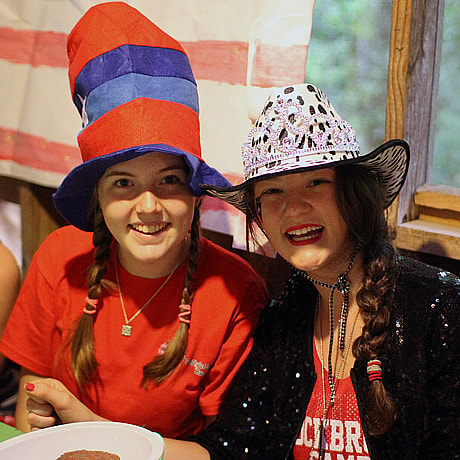
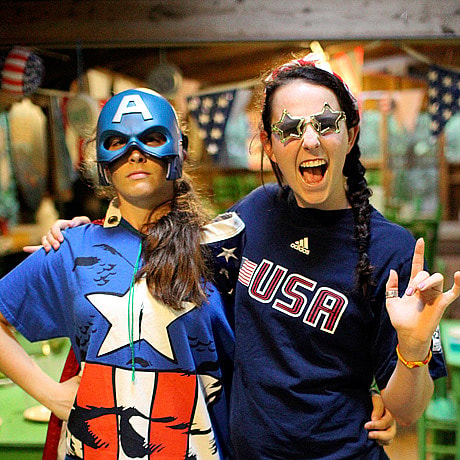
With the afternoon rafting trip, which was comprised of another three vans, back at camp in time for dinner, we learned that tonight’s meal was to be “All American,” with American food, decorations, songs, and all manner of red, white and blue costumes. The decorations were a hoot. Several counselors painted banners with slogans like “America the Beautiful,” USA, and “Freedom,” but also “Walmart,” McDonalds,” and “Coke.” Flags, streamers and balloons hung from the rafters, and all kinds of American-themed songs played over the speakers: “Party in the USA,” “Proud to be an American,” “American Girl,” and the “Star Spangled Banner.” To eat, Rick had Hamburgers and all the fixings, French Fries, and Watermelon. For costumes, you can see we had a visit from Captain America, and some pretty cool red, white and blue hats, sunglasses and shirts. The whole event was pumping with energy as the girls sang their favorite songs and started cheers, laughing and chatting between bites.
A quick word about sending mail to camp… Keep it coming! The old fashioned snail mail is the most exciting thing to receive in a camper’s mailbox, but our postal service here struggles to keep up with the huge amount of mail arriving in this area (14 summer camps in the county alone!). So I would suggest writing regular lettings and sending occasional emails as well. This will make sure your daughter has something in her box most days while she’s here.
We are off to a fantastic session!


